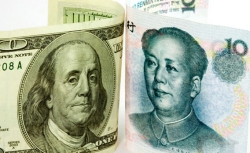Does China Do Capitalism Better Than America?
Watch—and participate in—the Slate/Intelligence Squared live debate on March 13.

Yong Hian Lim/Istockphoto.
China’s growth rate has risen to 12.5 percent, and its state-run economy is creating jobs and infrastructure at breakneck speed. Meanwhile, the United States, long the world’s champion of capitalism, faces high unemployment and staggering debt.
On the other hand, China’s per capita GDP remains troublingly low, and consumer spending is decreasing. A thrifty middle class may soon tire of funding elaborate state projects with its savings. Pollution has spiraled out of control. China’s cheerleaders extol the country’s superior ability to “plan ahead,” but detractors question whether Beijing has in fact given enough thought to the future.
Should America emulate the Chinese model of state capitalism, or will our traditional free market system weather this latest challenge? Four Sinologists, economists, writers, and policy advisers will tackle these questions at the next Slate/Intelligence Squared U.S. live debate on March 13 at NYU’s Skirball Center in New York City. We’d like to invite you to attend—we’re offering Slate readers a 30 percent discount on tickets (see below)—and we hope you will use the comments section of this article to submit questions for the debaters. We’ll pick the most interesting one, and moderator John Donvan will ask it at the event. Be sure to include your full name and hometown with your question.
The motion for the debate is “China Does Capitalism Better than America.” Euro Pacific Capital CEO Peter Schiff will team up with Orville Schell, journalist and director of the Center on U.S.-China Relations at the Asia Society, to support the motion. They’ll argue that Beijing has cultivated a new type of capitalism, one that couples a centrally planned system’s potential for quick action with the free market’s creative dynamism. Meanwhile, Eurasia Group founder and president Ian Bremmer will join Minxin Pei, an author and professor of government at Claremont McKenna College, to dispute the motion. Pei and Bremmer think state capitalists ultimately aspire to power, not profit—and that even with the best intentions, a cabal of bureaucrats can’t steer the market with the efficacy of the invisible hand.
The details about the debate:
When and Where: March 13, 2012, at Skirball Center for the Performing Arts, New York University, at 566 LaGuardia Place (at Washington Square South). The evening begins at 5:45 p.m. with a cash-bar reception for panelists and audience members; the debate will be at 6:45-8:30 p.m. For venue information, click here.
Tickets: $40 ($12 for students with ID). Purchase tickets here, and be sure to enter the special Slate promotional discount code, Slate30, to receive 30 percent off your ticket.
About the debaters
For the motion:
A former professor and dean at the University of California, Berkeley's Graduate School of Journalism, Orville Schell is the Arthur Ross Director of the Center on U.S.-China Relations at Asia Society in New York. The author of 14 books, nine about China, Schell worked for the Ford Foundation in Indonesia, covered the war in Indochina as a journalist, and has traveled widely in China since the mid-’70s. He is a fellow at the Weatherhead East Asian Institute at Columbia University, a senior fellow at the Annenberg School of Communications at USC and a member of the Council on Foreign Relations. Schell was a fellow at Columbia University's Graduate School of Journalism and the recipient of many prizes and fellowships, including a Guggenheim Fellowship, the Overseas Press Club Award, and the Harvard-Stanford Shorenstein Prize in Asian Journalism.
Peter Schiff is CEO & chief global strategist of Euro Pacific Capital. He accurately and publicly predicted the bursting of the housing market and the subsequent collapse of the financial sector and the broader U.S. economy. A staple figure in the media, he appears frequently on CNBC, Fox Business, CNN, and Fox News. He is the author of several books, including the best-selling Crash Proof: How to Profit from the Coming Economic Collapse, and an upcoming book, The Real Crash: How To Save Yourself and Your Country. Schiff served as an economic adviser to Ron Paul in 2008 and in 2011, launched The Peter Schiff Show, a daily radio talk show.
Against the motion:
Ian Bremmer is the founder and president of Eurasia Group, a leading global political risk-research and consulting firm providing financial, corporate, and government clients with information and insight on how political developments move markets. Bremmer created Wall Street’s first global political risk index and has authored several books, including the national best-seller, The End of the Free Market, The J Curve, and the upcoming Every Nation for Itself. Bremmer is a contributor for the Financial Times A-List and Reuters.com, writes "The Call" blog on ForeignPolicy.com, and is a panelist for CNN International’s Connect the World. He has a Ph.D. in political science from Stanford University and currently teaches at Columbia University.
Minxin Pei is the Tom and Margot Pritzker '72 professor of government and the director of the Keck Center for International and Strategic Studies. Formerly a senior associate and director of the China Program at the Carnegie Endowment for International Peace, his research focuses on democratization in developing countries, economic reform and governance in China, and U.S.-China relations. He is the author of From Reform to Revolution: The Demise of Communism in China and the Soviet Union and China’s Trapped Transition: The Limits of Developmental Autocracy. Pei’s research has been published in Foreign Policy, Foreign Affairs, The National Interest, Modern China, China Quarterly, Journal of Democracy, and many edited books. His op-eds have appeared in the Financial Times, the New York Times, the Washington Post, and other major newspapers. Dr. Pei received his MA and Ph.D. in political science from Harvard University.
The moderator:
John Donvan is an author and correspondent for ABC News. He has served as ABC’s White House correspondent, along with postings in Moscow, London, Jerusalem, and Amman, Jordan. He is writing a book on the history of autism, to be published by Crown in 2013.
